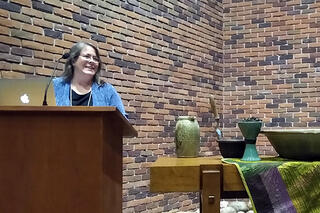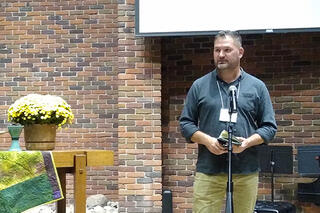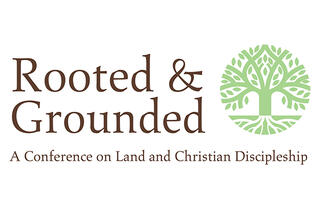
Debbie Bledsoe (third from right) of Raleigh, North Carolina, an AMBS Master of Divinity student who is co-chair of the AMBS Garden Committee, speaks during a Rooted and Grounded Conference workshop entitled, “Community Gardens as a Place of Encounter and Transformation.” Bledsoe described how one-seventh of the land in the garden is left fallow as directed in the book of Leviticus, and one-tenth is devoted to local community needs. (Credit: Jennifer Schrock for Mennonite Creation Care Network)
By Jennifer Schrock of the Mennonite Creation Care Network
ELKHART, Indiana (Anabaptist Mennonite Biblical Seminary and Mennonite Creation Care Network) — Healing and restoring our broken connections to the land — as individuals and communities — was the focus of the fifth Rooted and Grounded Conference on Land and Christian Discipleship, held Oct. 14–16, 2021, at Anabaptist Mennonite Biblical Seminary (AMBS) in Elkhart, Indiana.
More than 60 people participated in the event in person, and 20 people from across the United States and Canada joined selected sessions online. At least 17 different higher education institutions were represented by participants at the conference, which was sponsored by AMBS, the Center for Sustainable Climate Solutions and Merry Lea Environmental Learning Center of Goshen (Indiana) College.
Conference planners focused on the theme, “Land: Loss, Connection and Imagination.”
“We wanted to explore how we can live with hope in a time of ecological crisis and to imagine what resilience looks like,” explained Janeen Bertsche Johnson, MDiv, AMBS Director of Campus Ministries and the conference coordinator.
Over three days, keynote addresses, immersion experiences, workshops and imagination exercises moved those gathered from lament to longing, hope, faith and commitment to act for change.
Lessons from Timorese place relationships
 Laura Meitzner Yoder, PhD, a political ecologist and Professor of Environmental Studies at Wheaton (Illinois) College, gave the opening keynote address. Yoder, who also serves as Director and John Stott Chair of Human Needs and Global Resources at Wheaton, since 2001 has been in dialogue with small landholders and forest dwellers in Timor-Leste, a half-island nation between Indonesia and Australia.
Laura Meitzner Yoder, PhD, a political ecologist and Professor of Environmental Studies at Wheaton (Illinois) College, gave the opening keynote address. Yoder, who also serves as Director and John Stott Chair of Human Needs and Global Resources at Wheaton, since 2001 has been in dialogue with small landholders and forest dwellers in Timor-Leste, a half-island nation between Indonesia and Australia.
Yoder’s address, “Mobility, Displacement, Replacement: Learning from Timorese Place Relationships,” pushed listeners to view their own experiences through the lens of the Indigenous (Meto) people of western Timor island. After describing the ways in which Timorese family names incorporate place names, Yoder asked those present if any of them had names that refer to places. She also explained the Timorese practice of topogeny — the telling of one’s history through reciting strings of place names that highlight ancestors’ mobility and important happenings as they moved through the landscape — and asked her listeners to briefly reflect on their own topogenies.
According to Yoder, one unique aspect of western Timorese culture is a ritual authority figure known as a tobe who is tied to a particular body of land for life. The tobe is responsible to communicate with the spirits of the place and to approve decisions related to land use, resource extraction and agricultural rituals within that domain. Tobes are kept separate from outside influences and are not allowed to learn to read, write, travel freely or enter a church, since these things are believed to disrupt their communication with nature.
Drawing parallels to authors like Kathleen Norris and Wendell Berry, Yoder invited listeners to picture people they knew who were well grounded in a particular place.
“How does this spatial intimacy enable the person to communicate the sacredness of that place?” she asked.
Timor-Leste’s complex history contains much tragedy, Yoder said. The people have survived colonial displacement from laws favoring European landowners, Indonesian military displacement that killed a third of the population, and recent displacement due to economic modernization plans. According to Yoder, villagers still weep when they describe how in the early 1980s people were forced to cut down their protected sandalwood trees and load them onto military ships. Yet the Timorese have displayed resilience. Yoder described the practice of tara bandu, a time-bound prohibition on resource harvesting that Timorese have observed even in dire circumstances — such as when all of their palm and grass thatch roofs had been burned at the same time and the forest could not provide enough roofing material for everyone.
“I marvel at how tens of thousands of Timorese took the collective action necessary to allow their land and forests to heal and to recover,” Yoder said.
Shipwrecks, ancient and modern
 Timothy R. Eberhart, MDiv, PhD, offered the second keynote address, “Regenerative Solidarity Among the Remnants.” Eberhart serves as Murray H. Leiffer Associate Professor of Public Theology and Ministry at Garrett-Evangelical Theological Seminary in Evanston, Illinois. He directs the Master of Arts in Public Ministry degree and oversees a concentration in ecological regeneration.
Timothy R. Eberhart, MDiv, PhD, offered the second keynote address, “Regenerative Solidarity Among the Remnants.” Eberhart serves as Murray H. Leiffer Associate Professor of Public Theology and Ministry at Garrett-Evangelical Theological Seminary in Evanston, Illinois. He directs the Master of Arts in Public Ministry degree and oversees a concentration in ecological regeneration.
“How should we describe the present age?” Eberhart asked. “What metaphors or analogies might best convey a sense of the social and existential realities of our time?”
He likened the current circumstances to a societal shipwreck, referring to the story in Acts 27 of the Apostle Paul during a storm at sea and noting that in the third and fourth centuries, the desert mothers and fathers used shipwrecks as a common metaphor for the time of upheaval they lived in.
In the Acts story, prisoners (including Paul) clung to their ship’s wreckage and paddled ashore to the island of Malta following a devastating storm. The boat was an imperial ship, run by soldiers prepared to kill the prisoners in their care. Likewise, Eberhart said — drawing on the work of Margaret Wheatley and other systems thinkers — the present time is one of immense upheaval and collapse. The many crises in the world today have a deep history and include the removal of people from a direct relationship with the land; the exploitation of land and labor; the expansion of “free” market logics into more and more spheres of life; and the use of ideological frameworks such as White supremacy to justify abuses.
“How does it feel to be a leader in this time of disintegration?” Eberhart asked his audience, allowing time for them to reflect and offer a single word in response.
“Vulnerable … overwhelmed … alone … helpless … angry,” they replied.
“Genuine hope begins with a very hard realism,” he responded. “It begins on the cross with a great cry. It begins in the tomb with a dead body.”
Referring to the adaptive cycle of growth, conservation, release and reorganization that is present in natural systems, he emphasized that times of release also offer an immense opportunity for creative reordering — an “opportune time for deep, systemic change.”
While Eberhart sees Christian denominations as among the institutions experiencing upheaval, he insists that there are still spiritual and theological remnants to cling to.
“Grab hold of the remnants and stay afloat!” he urged. “Look for the gifts of the Spirit, for stored-up financial and institutional resources, and for the contributions of our distinct traditions — including Mennonite simplicity and peacemaking and the holistic theology of Methodism. Life-sustaining resources are floating all around.”
“Ours will remain a time of crucifixion and lament,” he concluded. “But as we weep, and come undone, let’s also grab hold, not just to what remains, but to one another. And then let’s reach together for the safety, and toward the just peace, of the land.”
Additional conference activities
 New this year were two extended sessions in which participants worked in groups to imagine ways that their combined gifts and resources could solve environmental challenges. Groups worked on issues such as caring for a community’s watershed; finding regenerative uses for empty city lots; overcoming the distance between faith and science; and strengthening a community farm. Luke Gascho, EdD, a planning committee member with expertise in organizational leadership, and Malinda Elizabeth Berry, PhD, Associate Professor of Theology and Ethics at AMBS and a planning committee member, led the process.
New this year were two extended sessions in which participants worked in groups to imagine ways that their combined gifts and resources could solve environmental challenges. Groups worked on issues such as caring for a community’s watershed; finding regenerative uses for empty city lots; overcoming the distance between faith and science; and strengthening a community farm. Luke Gascho, EdD, a planning committee member with expertise in organizational leadership, and Malinda Elizabeth Berry, PhD, Associate Professor of Theology and Ethics at AMBS and a planning committee member, led the process.
Participants also attended paper presentations and workshops on a range of topics, including Fannie Lou Hamer's environmental theology; planting and caring for trees; Wild Church worship; community gardens; Indigenous struggles for land and water rights; agrarian cultures and land revitalization; pastoral ecology; and lament as a healing practice; among others.
In addition to Berry, Gascho and Johnson, the planning committee for the event included Melissa Kinsey, MPA, an environmental educator; and Beverly Lapp, EdD, AMBS Vice President and Academic Dean. Rachel Miller Jacobs, DMin, AMBS Associate Professor of Congregational Formation; AMBS Master of Divinity student Sibonokuhle Ncube of Bulawayo, Zimbabwe; and Johnson served as worship planners.
Prior Rooted and Grounded conferences were held in 2014, 2015, 2017 and 2018.
Want to receive AMBS news and updates via email? Subscribe here.
